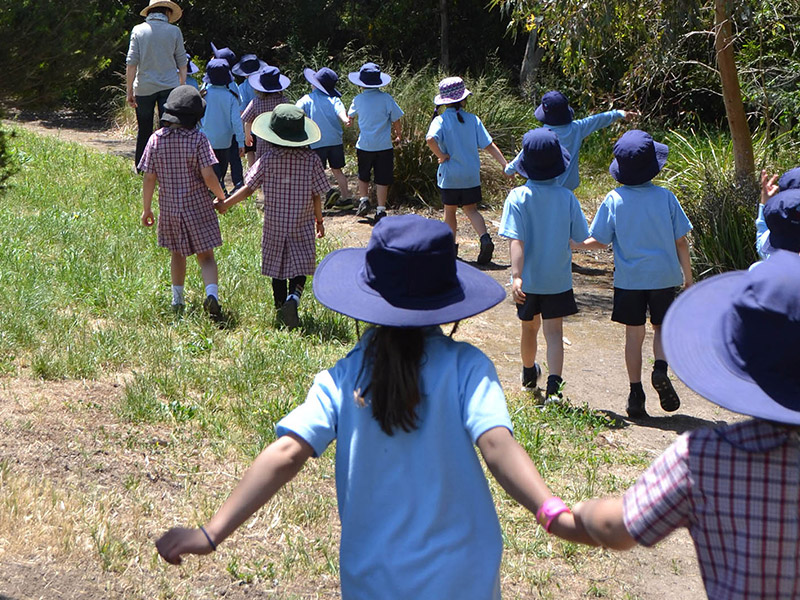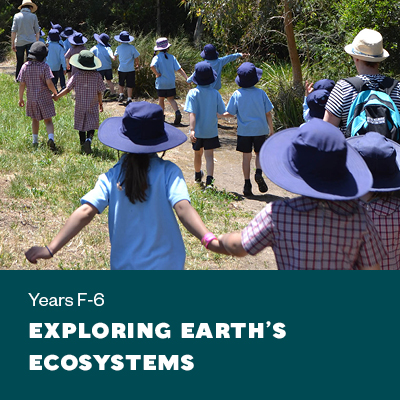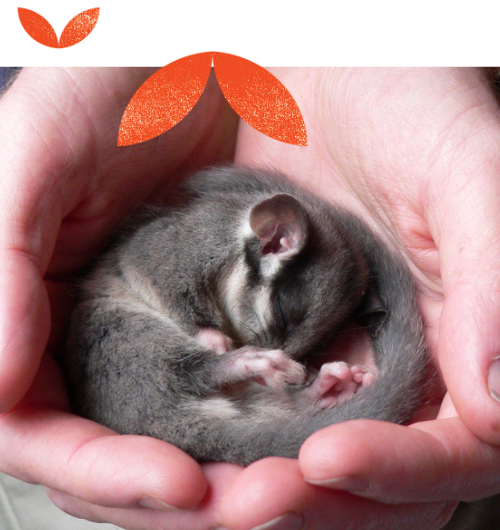Restoring Earth’s Ecosystems – Excursion
Hosted by expert educators, students will develop their understanding of living and non-living things and the positive and not-so-positive impacts of human interactions on an ecosystem through hands-on activities.
The UN Decade on Ecosystem Restoration (2021-2030) aims to prevent, halt and reverse the loss of ecosystems across the globe. Through this lens, students will engage with local ecosystems firsthand to understand the impacts of human actions, both positive and negative. Our educators will guide students through problem-solving and action planning to build skills they can take to restore ecosystems within their school community.
For Years F-2, the Restoring Earth’s Ecosystems program can be examined through either a Land Management option or a Water Management option. Please indicate your preferred option when filling in the ‘book now’ form.
Key Questions for Students to Consider
- How are ecosystem, biodiversity and habitat connected?
- What can we do to improve the health of ecosystems?
- How does restoring ecosystems allow us to connect with Country?
Program Overview Years F-2 – Land Management
- Discover a local ecosystem and how it supports biodiversity.
- Identify the needs of different animals and how we can support their habitat.
- Connect with Country through the skill of observation and take action to restore local ecosystems.
Program Overview Years F-2 – Water Management
- Explore a local wetland and the variety of life it can support.
- Understand water cycles and the positive impacts humans can have on waterways.
- Observe how changes in weather systems impact wildlife and take action to restore local wetlands.
You’ll receive a school teacher guide, including instructions for optional activities to do before and after your excursion at CERES to get your students thinking, discussing, and actively contributing to a world that is environmentally sustainable for all living creatures.
Key Questions for Students to Consider
What do ecosystems need to be healthy? How do humans impact habitat health? How can the community restore local ecosystems through land and water management?
Program Overview Years 3-6
- Discover a wetland ecosystem and how it supports local biodiversity.
- Identify habitat needs of different native fauna and gain skills in habitat restoration
- Explore the urban water cycle and how water management affects ecosystem health.
You’ll receive a school teacher guide, including instructions for optional activities to do before and after your excursion at CERES to get your students thinking, discussing, and actively contributing to a world that is environmentally sustainable for all living creatures.
Key Questions for Students to Consider
- What do ecosystems need to be healthy?
- How do humans impact habitat health?
- How can the community restore local ecosystems through land and water management?
COMING SOON: You’ll receive a school teacher guide, including instructions for optional activities to do before and after your excursion at CERES to get your students thinking, discussing and actively contributing to a world that is environmentally sustainable for all living creatures.
Years F – 2 (Land and Water)
- Students understand the importance of biodiversity and how it creates healthy ecosystems.
- Students consider the impacts humans have on local land or waterway ecosystems and how small actions can have big consequences on local flora and fauna.
- Students understand that animals have different habitat requirements and can identify the basic needs of native wildlife.
- Students can describe the water cycle and the four steps which make up the cycle: collection, evaporation, condensation and precipitation.
- Students recognise that observing and connecting with Country is an important step in understanding it.
- Students understand important future steps to maintain habitat and ecosystems in their own area.
Years 3 – 6
- Students understand the importance of biodiversity and how it creates healthy ecosystems.
- Students consider living things in an ecosystem and how they affect different food chains.
Students can identify actions humans can take to assist with ecosystem health and enrich biodiversity. - Students use scientific methods to measure and analyse the potential of an ecosystem to support particular wildlife.
- Students experience and see the results of community collective-action at CERES Community Environment Park, in particular how we manage land and water sensitively on site.
- Students develop skills they can take home to connect to Country and restore ecosystem health.
Years 7 – 10
- Students understand the importance of biodiversity and its link to ecosystem health.
- Students use scientific methods to assess the biotic and abiotic factors that support biodiversity in a local wetland ecosystem.
- Students identify the importance of connections between biotic factors in an ecosystem and how habitat alteration affects biodiversity.
- Students learn to collect data on how ecosystems support local fauna and identify practical ways to restore habitats.
- Students evaluate past use of land and apply this information to current land and water management practices.
- Students reflect on how community action and intentional, urban development can support ecosystem restoration.
This program links to curriculum areas of:
Science, Design & Technology, Geography, English, Civics & Citizenship, History, Intercultural Capabilities, Maths
Availability
Monday – Friday during term time
For weekend and school holiday bookings please contact
Full Day: 10am – 2pm (Three activities)
Welcome and introductions – 20 mins
Session with CERES educator – 60 mins
Break – 20 mins
Session with CERES educator – 50 mins
Break – 30 mins
Session with CERES educator – 60 mins
Explore CERES – Make sure you leave some time to explore the many spaces of our beautiful park, including our new Terra Wonder Play Space.
Use the activities in the Teaching Guide below to spark students’ curiosity before their visit and add value to your experience whilst at CERES. It’s also designed to deepen students’ learning back at school.
Use the activities in the Teaching Guide below to spark students’ curiosity before their visit and add value to your experience whilst at CERES. It’s also designed to deepen students’ learning back at school.
Foundation to Year 2 Teaching Guide (Land)
Foundation to Year 2 Teaching Guide (Water)
Years 3 to 6 Teaching Guide
Years 7 to 10 Teaching Guide
Watch the following video to understand what CERES is all about and to get you and your students excited about your visit!








